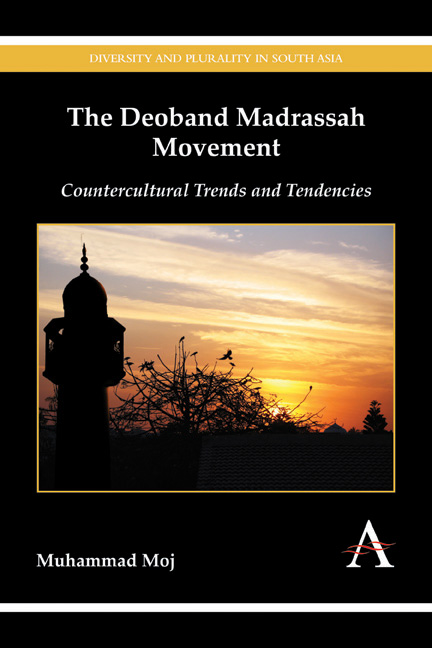Book contents
- Frontmatter
- Dedication
- Contents
- Preface
- Prologue
- Chapter 1 The Deoband Madrassah Movement: Research Context
- Chapter 2 Origin of the DMM: Seeds of a Counterculture
- Chapter 3 The DMM in United India: Activist Countercultural Trends
- Chapter 4 The DMM in Pakistan: Countercultural Politics and Extremism
- Chapter 5 Deobandi Islam: Countering Folk Islam and Popular Custom
- Chapter 6 The DMM versus Mainstream Society: Viewpoints of Deobandi Journals and Students
- Epilogue
- Appendix I The Deobandi Stance vis-à-vis Muslim Groups other than the Barelwis
- Appendix II Countercultural Exposition of the Deobandi Taliban
- Appendix III Interview Guide
- Glossary of Islamic Terms
- References
- Index
- Frontmatter
- Dedication
- Contents
- Preface
- Prologue
- Chapter 1 The Deoband Madrassah Movement: Research Context
- Chapter 2 Origin of the DMM: Seeds of a Counterculture
- Chapter 3 The DMM in United India: Activist Countercultural Trends
- Chapter 4 The DMM in Pakistan: Countercultural Politics and Extremism
- Chapter 5 Deobandi Islam: Countering Folk Islam and Popular Custom
- Chapter 6 The DMM versus Mainstream Society: Viewpoints of Deobandi Journals and Students
- Epilogue
- Appendix I The Deobandi Stance vis-à-vis Muslim Groups other than the Barelwis
- Appendix II Countercultural Exposition of the Deobandi Taliban
- Appendix III Interview Guide
- Glossary of Islamic Terms
- References
- Index
Summary
This book explores the history and evolution of Deobandi Islam, a South Asian Sunni sect whose origin dates back to 1866 when a madrassah movement was launched in the small North Indian town of Deoband. Since its inception, Deobandi Islam has survived and spread mainly through its madrassah network, which has produced Deobandi prayer leaders, preachers and politicians on the one hand and has paved the way for the creation of extremist Deobandi organizations like the Taliban and Lashkar-e-Jhangwi on the other. The latter role of the Deobandi movement makes it all the more relevant in the present scenario, whereby a global wave of extremism and terrorism has seriously threatened world peace.
Unlike the existing literature that has studied the Deobandi movement in the context of political Islam and religious reform, this book endeavours to interpret this madrassah-based movement from a countercultural perspective. By employing an offbeat approach, this book tries to explain the background of the perennial conflict between the Deobandi sect and mainstream Muslim society in the subcontinent. An attempt has also been made to identify the countercultural currents in the 150-year-long history of the Deobandi movement. In addition to that, a comparative analysis of the values and attitudes of the students of a Deobandi madrassah and a mainstream educational institution has been included to underline the countercultural mindset of Deobandi Islam. In its concluding section, the book looks at some probable scenarios with respect to the future of Deobandi Islam as a counterculture.
The main objective of this work is to understand Deobandi Islam from a different perspective. This work is expected to be of ample interest and importance to the intelligentsia and academia on the one hand and politicians and policymakers on the other. By giving an insight into the making of the mindset of the Deobandi Taliban, this work also hopes to add considerable value to the on going policymaking process vis-à-vis the future of the Pak-Afghan region, especially after the withdrawal of NATO forces from Afghanistan.
- Type
- Chapter
- Information
- The Deoband Madrassah MovementCountercultural Trends and Tendencies, pp. ix - xPublisher: Anthem PressPrint publication year: 2015

